Key takeaways:
- Setting realistic financial goals increases motivation, reduces stress, and enhances decision-making, leading to long-term success.
- Understanding your current financial situation through honest assessment helps identify spending habits and prioritizes areas for improvement.
- Building accountability by sharing goals with others and engaging in communities can significantly boost motivation and commitment to achieving financial objectives.
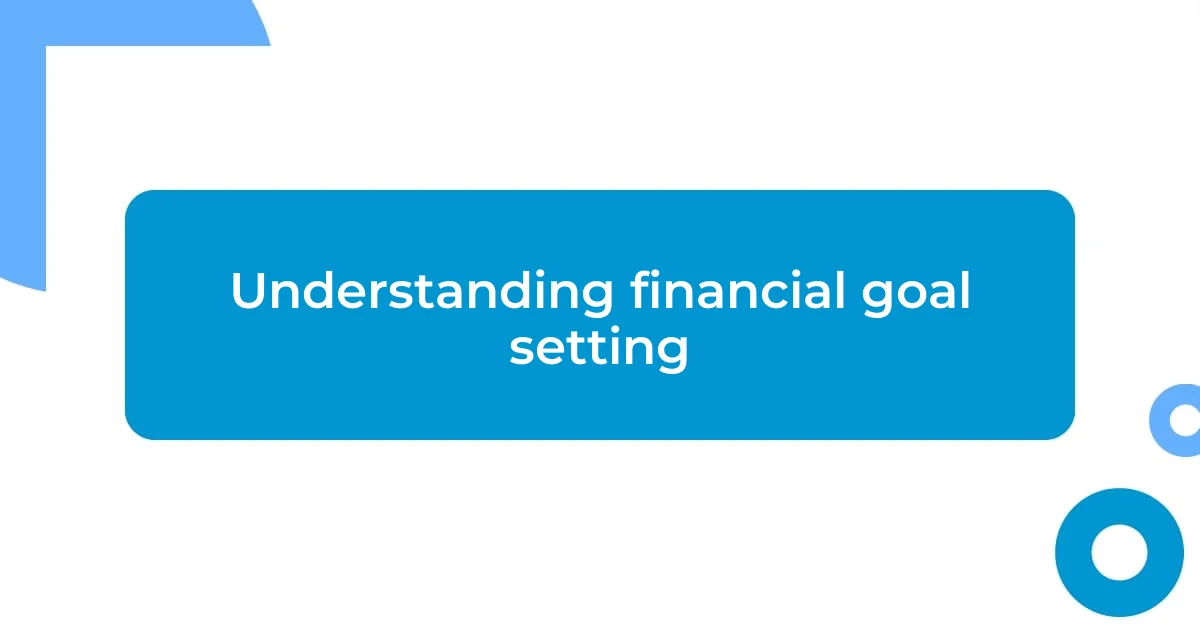
Understanding financial goal setting
Understanding financial goal setting is crucial because it lays the foundation for achieving long-term stability and peace of mind. I remember the first time I realized the importance of having a clear goal—I was trying to save for a vacation, but without a specific target, the money just seemed to vanish into thin air. Have you ever found yourself in a similar situation, wondering where your savings went?
Creating financial goals also means being realistic about what you can achieve. I’ve set goals that were so ambitious, they left me feeling defeated because I couldn’t keep up. It’s essential to ask yourself: Are the goals I’m setting achievable within my current circumstances? Understanding your financial situation and setting the right benchmarks can transform your strategy and lead to real success.
Moreover, it’s not just about numbers; it’s about envisioning the life you want. When I set a goal to save for a home, I didn’t just think of the down payment; I imagined family gatherings and weekend barbecues in my future yard. What kind of emotions do your financial goals stir in you? Identifying the ‘why’ behind your goals makes them feel more personal and motivating.
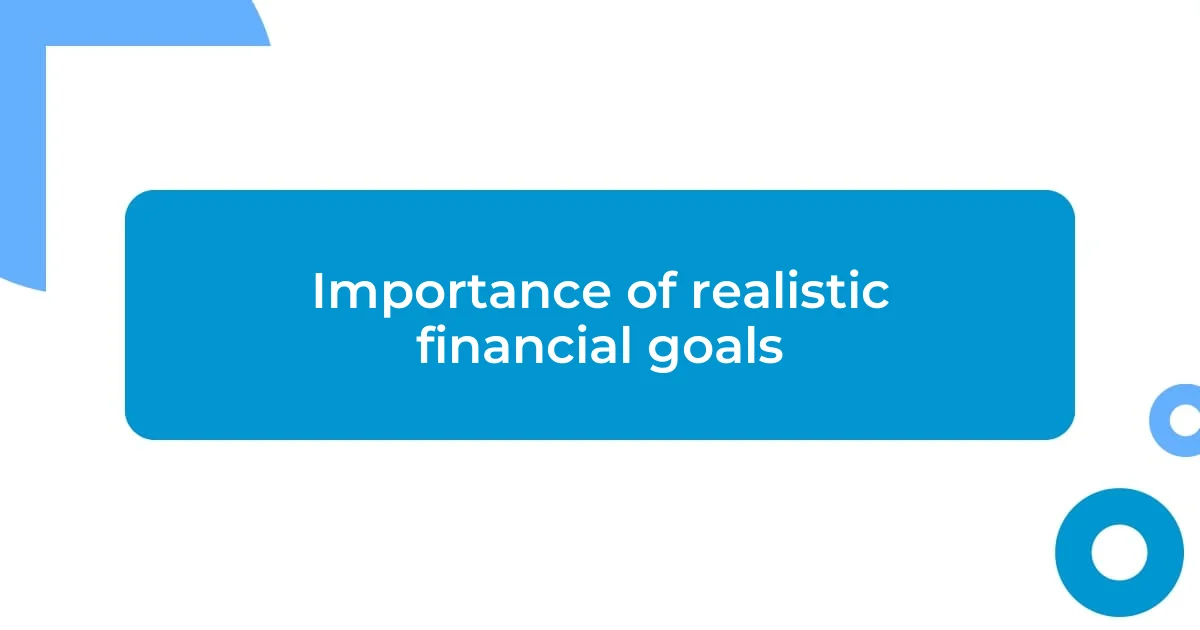
Importance of realistic financial goals
Setting realistic financial goals is crucial for maintaining motivation and achieving long-term success. I once set a goal to save a hefty sum in just a few months, only to realize I was setting myself up for frustration. When my expectations were unaligned with my reality, instead of feeling accomplished, I felt disheartened. This experience taught me that it’s essential to find a balance—goals should push you, but not overwhelm you.
Here are some reasons why having realistic financial goals matters:
- Increases Motivation: Achievable goals keep you energized and focused on your progress.
- Reduces Stress: Knowing your targets are within reach can alleviate anxiety and foster a healthier financial mindset.
- Enhances Decision-Making: Realistic goals provide a clear framework for making informed financial choices.
- Builds Confidence: Meeting targets, whether big or small, cultivates a sense of achievement that encourages taking on more goals in the future.
- Creates a Sense of Purpose: Having a defined purpose behind your goals aligns your spending habits with your values, making the journey more rewarding.
The impact of realistic financial goals goes beyond mere numbers; they shape our lifestyles and empower us. Imagine being able to enjoy a spontaneous day trip without worrying about your bank balance because you’ve planned for it. That’s the kind of freedom I cherish, and it all stems from the foundation of realistic goal-setting.
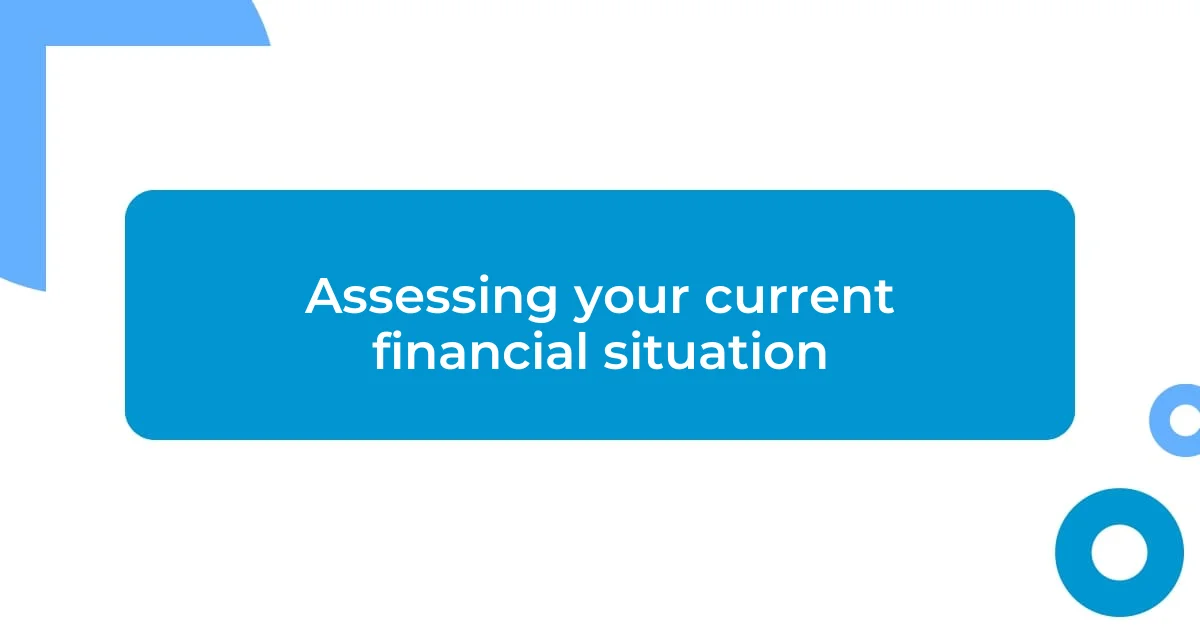
Assessing your current financial situation
Assessing your current financial situation is a vital first step in establishing realistic goals. I vividly recall the day I sat down with my bills and bank statements, feeling overwhelmed yet determined to gain clarity. An honest assessment revealed not just my income and expenses, but also my spending habits that were quietly draining my resources. Have you ever closely examined where your money goes? It can be eye-opening.
Understanding your financial picture involves more than simple calculations. I learned that tracking my cash flow made me aware of patterns I hadn’t noticed before, such as weekly coffee runs or subscription services I rarely used. This awareness allowed me to identify areas where I could cut back and redirect those funds towards my financial goals. It’s crucial to recognize these spending habits to optimize your budget effectively.
Finally, compiling a list of assets and liabilities proved beneficial. When I compared what I owned—like my old car and savings accounts—against my debts, it became evident where I needed to focus my efforts. This clarity didn’t just empower my decision-making; it motivated me to take action. How does your current situation stack up against your financial aspirations? Assessing your reality can create a strong foundation for informed goal-setting.
| Financial Element | Importance |
|---|---|
| Income | Understanding your income helps set realistic spending limits. |
| Expenses | Recognizing where your money goes allows for better budget adjustments. |
| Assets | Assets provide a sense of security and can be leveraged for future investments. |
| Liabilities | Knowing your debts is crucial for creating a repayment strategy. |
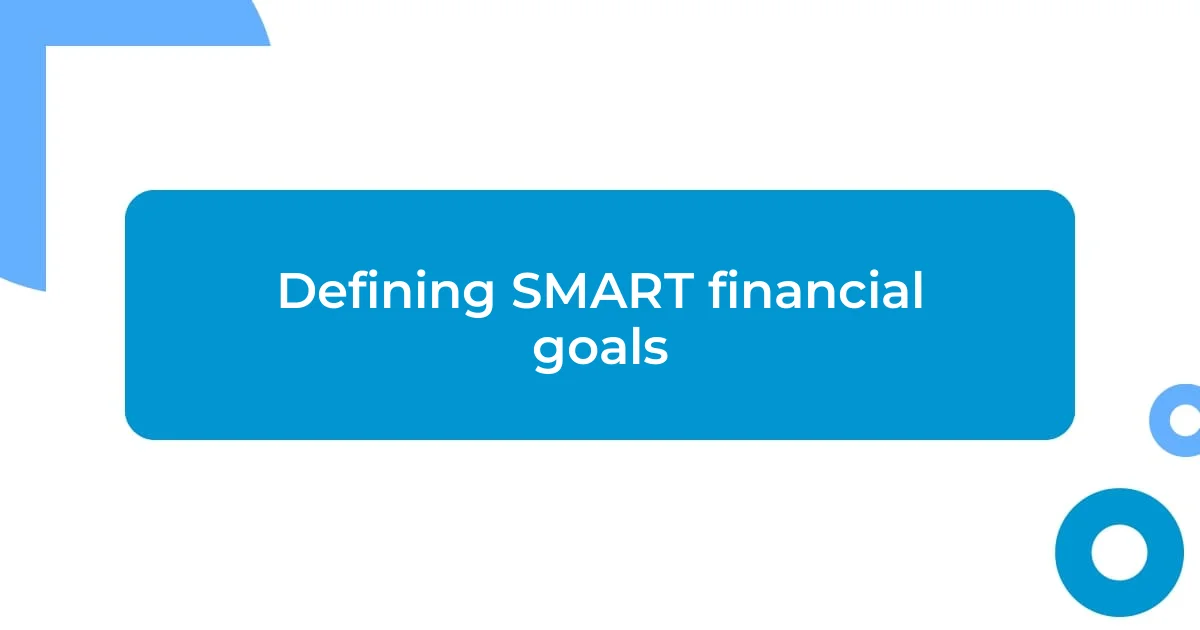
Defining SMART financial goals
Defining SMART financial goals is a game-changer in how we approach our finances. The SMART framework stands for Specific, Measurable, Achievable, Relevant, and Time-bound. I still remember when I first applied this method; I went from vague ambitions, like “I want to save money,” to clearly defined goals such as “I will save $5,000 for a vacation within the next year.” This clarity made a huge difference in how I viewed my progress.
When I set out my first SMART goal, I realized each component is like a puzzle piece. Specificity gives direction; without it, we can easily lose focus. Measurable means tracking progress—like when I started saving $500 a month towards my vacation fund. The satisfaction I felt seeing those savings grow was incredibly motivating. Have you ever celebrated a financial milestone? It can genuinely boost your confidence to keep striving!
Moreover, ensuring your goals are relevant keeps them aligned with your broader life objectives. I once had a goal to invest in stocks, but I realized I was more passionate about travel experiences. Redirecting my energy towards saving for exploration made my journey feel more meaningful. Finally, a time-bound goal creates urgency—just think about how setting a deadline can spark action. Each SMART goal I’ve achieved has taught me not just about finances, but about perseverance and dedication. So, what’s your next SMART goal going to be?
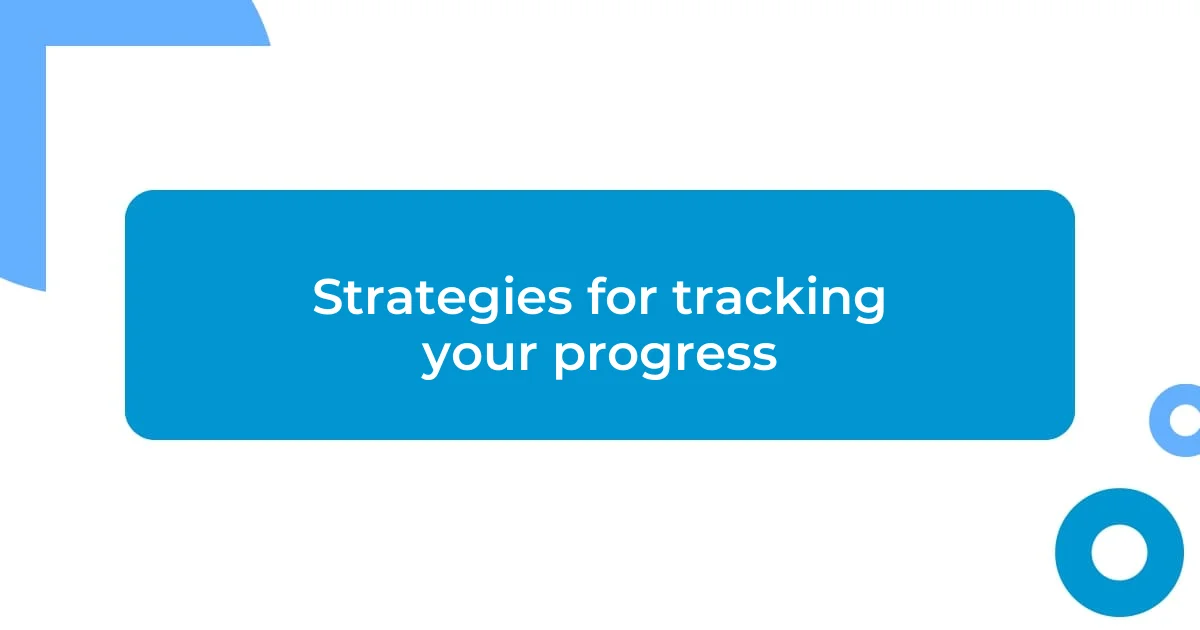
Strategies for tracking your progress
Tracking progress towards financial goals is essential for staying motivated. One strategy I’ve found effective is creating a financial journal. I genuinely enjoy recording my monthly expenses and savings milestones. It’s fascinating to look back and see how I’ve evolved over time; those pages reflect my journey and help keep my goals front and center. Have you ever tried writing down your progress? It can be surprisingly empowering.
Another tactic I highly recommend is using budgeting apps. When I first downloaded one, it revolutionized my financial management. The visual representation of my spending and saving was a game-changer. It felt like I had a personal coach, nudging me along as I hit my targets. I still recall the thrill of hitting my savings goal for that much-anticipated trip. These apps often offer insights that you might not notice on your own; they can highlight spending trends and help refine your budget accordingly.
Lastly, don’t underestimate the power of regular progress reviews. I schedule a monthly check-in with myself, assessing my financial standing and adjusting my strategies if needed. This ritual keeps me accountable and helps celebrate small wins. Have you ever reflected on your financial journey? It’s a chance to appreciate how far you’ve come and to recommit to your goals. Recognizing progress, no matter how small, fuels my drive to keep pushing forward.
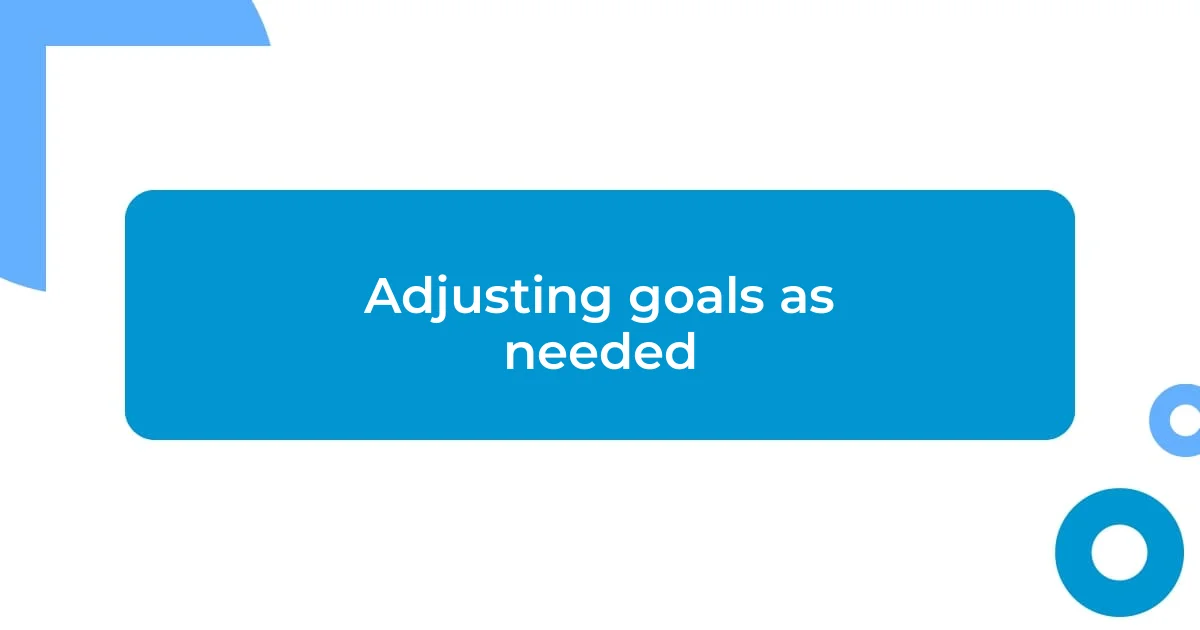
Adjusting goals as needed
Adjusting your financial goals isn’t just about shifting numbers; it reflects your evolving priorities and circumstances. I recall a time when I aimed to save for a new car within two years. Halfway through, my job situation changed, making it essential to redirect those savings towards an unexpected medical expense. It was disappointing at first, but recognizing the need for flexibility allowed me to pivot without completely losing sight of my financial health.
Sometimes, the very goals we set can become irrelevant as life unfolds. I once focused on paying off my student loans aggressively, but when I discovered a passion for freelance work, I realized investing in my skills would yield better long-term benefits. I had to ask myself: what truly matters right now? In that moment of reflection, adjusting my goals didn’t feel like failure; it was an investment in a brighter future.
Additionally, I’ve found that regularly reassessing my goals helps keep them in sync with my life. I like to sit down every three to four months to evaluate my progress and think about adjustments. This practice not only keeps me accountable but reignites my passion and commitment. Have you thought about when to review your goals last? It’s a helpful checkpoint that can breathe new life into your financial journey. Each change becomes part of a larger narrative, and I find it deeply rewarding to adapt my path as my story unfolds.
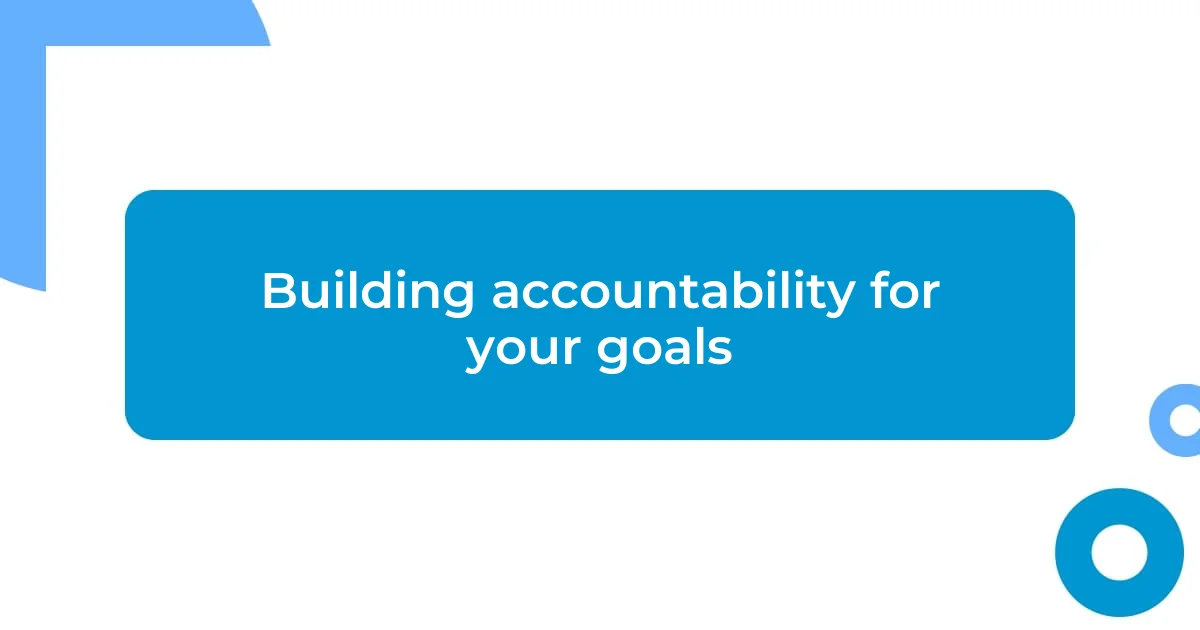
Building accountability for your goals
Establishing accountability is crucial in the pursuit of financial goals. One of the most effective methods I’ve encountered is sharing my goals with a trusted friend or family member. Not only do they provide encouragement, but they also help me stay on track. I remember when I confided in a close friend about my plan to save for an emergency fund. Having someone to check in with transformed my approach. It was no longer just about me; I felt a shared responsibility. Have you ever told someone about your goals? You might be surprised by how much that can motivate you.
Another strategy that has proven beneficial for me is setting up a public commitment. I once posted my savings goals on social media, and I can’t describe the thrill when my followers showed their support. It added an unexpected layer of responsibility. I found myself thinking twice before slipping up on my budget because I knew people were watching. Have you thought about leveraging your social networks? Sometimes, the collective encouragement can really lift your spirits.
Regularly seeking feedback can also enhance accountability. I like to join financial forums and engage in discussions about goal-setting and achievements. Recently, I sought feedback on my investment strategy from fellow members. The insights I received helped refine my approach significantly. Why not surround yourself with a community that shares your aspirations? After all, learning from others’ experiences can be incredibly enlightening and can reinforce your commitment to your financial journey.














